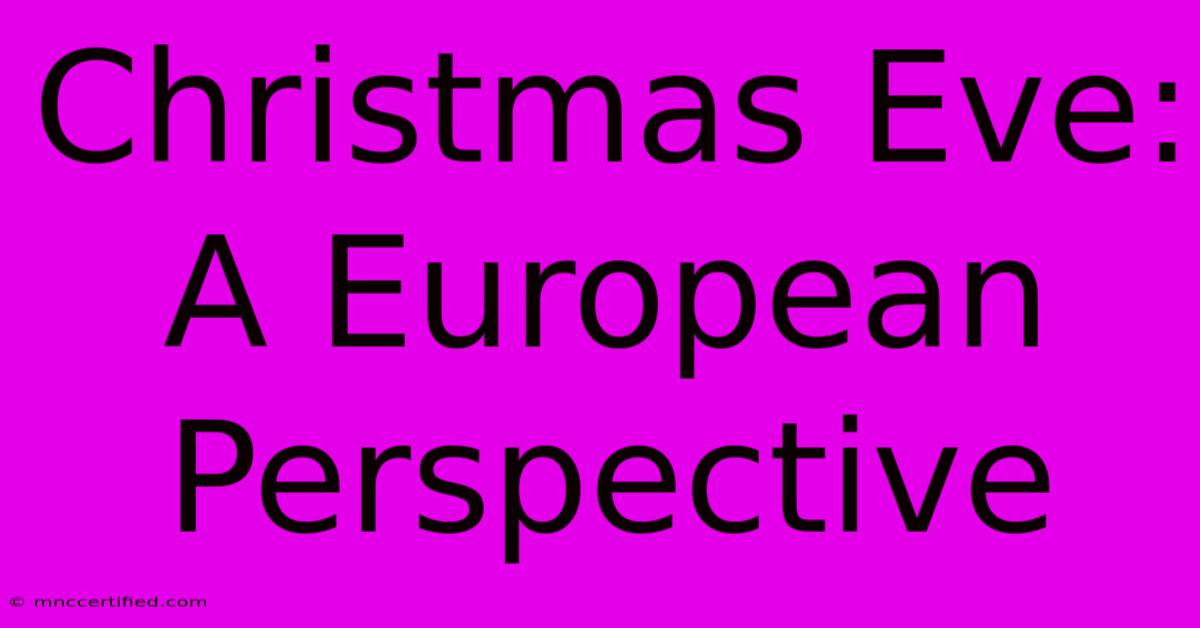Christmas Eve: A European Perspective

Table of Contents
Christmas Eve: A European Perspective
Christmas Eve, the day before Christmas Day, holds a special significance across Europe, varying dramatically from country to country. While the overarching theme remains the celebration of the birth of Jesus Christ, the traditions and customs observed paint a vibrant tapestry of diverse cultural expressions. This exploration dives into the unique Christmas Eve celebrations across Europe, highlighting the rich heritage and fascinating practices that make this holiday so special.
Diverse Traditions: A Continental Christmas Eve
From bustling markets to quiet family gatherings, Christmas Eve in Europe is a multifaceted experience. Let's explore some key differences:
The United Kingdom: A Festive Feast
In the UK, Christmas Eve is often a time for festive preparations. Families might decorate their homes, bake traditional treats like mince pies and Christmas pudding, and participate in festive activities like carol singing. The focus often shifts to the anticipation of Christmas Day, with many families enjoying a relatively relaxed evening, perhaps watching a Christmas movie or playing board games. Gift-giving traditionally happens on Christmas Day, not Christmas Eve.
Germany: A Time for Bescherung and Stille Nacht
Germany is renowned for its enchanting Christmas markets, providing a magical atmosphere in the days leading up to Christmas. Christmas Eve, or Heiligabend, is a time for family togetherness. The traditional Bescherung, the act of opening presents, usually takes place on Christmas Eve, often after attending a church service or enjoying a special Christmas Eve dinner. The serene carol, Stille Nacht (Silent Night), composed in Austria, is a beloved part of German Christmas Eve celebrations, underscoring the spiritual aspect of the holiday. Keywords: German Christmas Eve, Heiligabend, Bescherung, Stille Nacht, Christmas Markets.
Spain: A Night for the Lottery and Family
In Spain, Christmas Eve, or Nochebuena, is a time for elaborate family dinners. La Lotería de Navidad, the Spanish Christmas Lottery, is also drawn on December 22nd, adding an extra layer of excitement to the festive season. The dinner often features traditional dishes like roasted lamb or seafood, and the evening is filled with family conversation and laughter. The night culminates in the celebration of the birth of Jesus and the anticipation of the arrival of the Reyes Magos (Three Wise Men), who bring gifts on Epiphany (January 6th). Keywords: Nochebuena, La Lotería de Navidad, Reyes Magos, Spanish Christmas traditions.
Italy: A Festive Feast and Midnight Mass
In Italy, Christmas Eve, or Vigilia di Natale, is predominantly a religious holiday. Many families attend Midnight Mass, a deeply spiritual experience marking the birth of Christ. The Christmas Eve dinner is an important part of the celebration, and the menu varies regionally, but often includes seafood dishes due to religious traditions of abstaining from meat on this eve. The focus remains on family, faith, and the anticipation of Christmas Day. Keywords: Vigilia di Natale, Italian Christmas Traditions, Midnight Mass, Italian Christmas Eve dinner.
France: A Feast of the Senses
In France, Réveillon de Noël is the Christmas Eve celebration, a time for lavish feasts and family gatherings. The menu is usually quite extravagant, and often includes roasted meats, oysters, and other delicacies. Families often attend Midnight Mass and spend the rest of the evening together, sharing stories and enjoying each other's company. The emphasis is on shared experiences and the joy of being together during the holiday season. Keywords: Réveillon de Noël, French Christmas Traditions, French Christmas Eve Dinner.
Beyond the Traditions: The Universal Spirit of Christmas Eve
While traditions may differ, the underlying spirit of Christmas Eve remains consistent across Europe: a time for family, faith, reflection, and the joyful anticipation of Christmas Day. It's a time for creating cherished memories and celebrating the warmth of the holiday season with loved ones.
The variations in customs across European countries serve as a reminder of the rich diversity and cultural heritage within the continent, highlighting how a single holiday can be interpreted and celebrated in so many unique and beautiful ways. This shared celebration, with its distinct regional flavors, ensures Christmas Eve continues to hold a special place in the hearts of millions across Europe.
Further Exploration: Delving Deeper into European Christmas Traditions
For a deeper dive into the Christmas traditions of specific European countries, consider researching individual national customs and researching the historical and religious context behind their unique practices. Happy exploring!

Thank you for visiting our website wich cover about Christmas Eve: A European Perspective. We hope the information provided has been useful to you. Feel free to contact us if you have any questions or need further assistance. See you next time and dont miss to bookmark.
Featured Posts
-
26 Year Old Swiss Snowboarder Killed
Dec 25, 2024
-
False Alarm Eiffel Tower Christmas Evacuation
Dec 25, 2024
-
You Ll Shoot Your Eye Out Review
Dec 25, 2024
-
Moana 3 Concept War Breaks Out
Dec 25, 2024
-
Revealed Nigel Bates East Enders Return
Dec 25, 2024